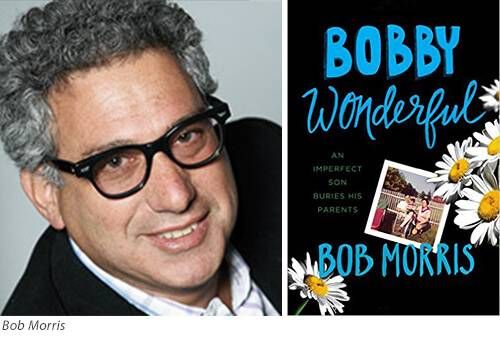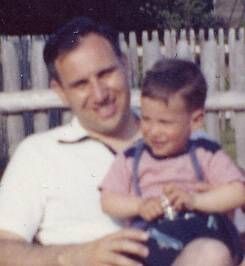A Son Regrets How He Treated His Dying Parents
Bob Morris hopes his story will help others whose parents are dying
Several recent memoirs have taken heartwarming looks at the deaths of parents, including Scott Simon's Unforgettable and Will Schwalbe's The End of Your Life Book Club. Bob Morris' Bobby Wonderful could be sold on the same table as those books, but it wouldn't be a perfect fit. Its subtitle hints at some less-than-heartwarming moments: An Imperfect Son Buries His Parents.
Morris, who previously wrote Assisted Loving, a wry account of helping his octogenarian father re-enter the dating pool after the death of his mother, is hard on himself in Bobby Wonderful, the title of which consists of, respectively, his mother's and father's final words.
"If I wasn't honest and very sensitive about all the things I could have done differently, I don't think readers would be responding," says Morris. "If I had been completely present and wonderful, how do people learn from that? I think we learn from each others' conflicts, not each others' successes."
So Bobby Wonderful is candid about Morris being unable to decide whether to cut short a vacation to visit his dying mother, Ethel; about yelling at his dad, Joe, when his father's weak heart made it difficult for him to walk and about hoping an anti-depressant prescription for his dad would get Joe off Bob's back.
"When people of this generation are looking at their parents and they're in their last years, I do think most of us suffer from wishing we had done more," says Morris, 57. "I was defending myself and making points almost to the end. And, in fact, one of my biggest regrets is how much I nagged my parents to exercise. We think it's helpful, but it's hard on them and, in a way, we need to respect their wishes. We don't live in them. Why should we be telling them what to do?"
'Death Is for the Living'
Morris may not have been as present as he'd have liked during the deaths of his parents, but he says he hopes his regrets can help others realize what he eventually figured out: "Death is for the living."
Morris writes: "Most aren't perfect and selfless children who want to move their parents in with them and have their ashes scattered at the ballet. They don't have the vision to see what only the selfless and enlightened can know when in the middle of it, and what I only know now that the experience is behind me, making it easy to say: Caring for your parents is an opportunity."
He means that in a number of ways.
In Morris' case, it was an opportunity for him and his brother to realize their hospital-room clashes came not from ego or foolishness but from differing views on what was best for their parents. It was an opportunity for the author to connect with what he calls his "best self." And caring for his dad was an opportunity to turn something terrible — a year-long fade caused by heart trouble — into something uplifting.
"I can't tell you how many times I was playing piano with my father, who was then in a wheelchair, and I would see him rally to sing with me," says Morris. "I would always choke up. How was it that I was able to do something so simple but that gave him so much pleasure? Every time I took him on a little drive around his place on Long Island, every time I was motivated to do something that gave me joy myself, it, of course, gave him joy, too. He was so happy to give pleasure."

Finding Pleasure and Fun
Morris is reluctant to get, as he says, "too self-helpy," but one of his recommendations for others caring for their parents centers around that word, pleasure.
"I guess I learned to find the pleasure, the poetry and the fun in the death of parents," Morris says with a chuckle, adding that sharing a parent's beloved activity, whether it's looking at photo albums or playing Scrabble, can become hugely important. "If you do it, they know it and they appreciate it. They will feel that, instead of an obligation, they are a pleasure. That's what I would say: Make them feel like a pleasure."
One other opportunity, of course, is that a parent's death can give you a preview, even if it's an unwelcome one, of your own mortality.
Morris witnessed his mother's prolonged death and his father's somewhat quicker one and he's not sure how he'd want loved ones to proceed if he were in those situations, although he jokes, "If I could figure out a way with hand signals to tell them to pull the plug, that's probably what I would do."
The Power of Truth
Morris is also unsure what his parents would think about the book whose title they supplied, albeit posthumously. (One hint: His lawyer dad threatened to sue him if he didn't change the title of his previous book from Pimping for My Father to its eventual Assisted Loving.)
What Morris hopes is that his folks would like the idea that telling their stories might help others.
"You can't underestimate the power of truth in these situations," says Morris. "I know my mother would not be happy to have people see her on her deathbed, but, on the other hand, this book is filled with light and sweetness and flashing back to me on her lap, while my dad was playing tennis and she was reading to all of us and singing songs with us in the backyard at night."

Those kinds of memories are some of the most powerful images in the book, which also includes a scene of Joe Morris savoring one last strawberry before he dies. In addition to a father's enjoyment, that scene registers as two sons making one last memory of their dad and beginning to realize that they need to figure out what their father's death means to them.
"The book is filled with those pleasures, the very unglamorous but pleasurable moments of being a family together," says Morris. "I hope people recognize that if you are able to see something so simple but profoundly beautiful, to see it clearly and know how beautiful it is, well, I think that's the whole point of life."
Samples of Writing from 'Bobby Wonderful'
Here are a few memorable lines in Bobby Wonderful:
"Shameful as it is to admit, neither of my parents was what I'd have ordered from a parent catalog. And yet they were so good to me; they loved me so much, even more than each other. They deserved so much more than what I gave them in their last years."
"The Buddhists have a word for the transitional state when the spirit has left the body but hasn't settled into a new one yet. It's called Bardo, a critical moment that determines where a soul will be reincarnated. I wonder, though, if it isn't a critical moment not only for the dying but for the living, too. Who are we about to become in the wake of the death of someone so important?"
"It is what it is. So is life. The only thing I can do now for my father is be there for him with all the love I can find."
"Maybe it's not such a bad thing to treat each good-bye as if it's a last one. It gives resonance to the moment, puts us on our best behavior, removes the pettiness and adds meaning so that we really see each other, hear each other, feel each other, feel what is so sacred in our time together."

